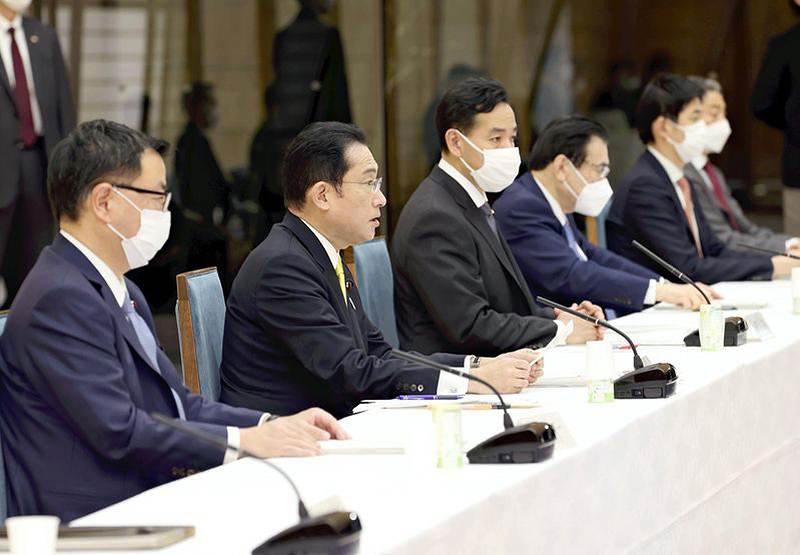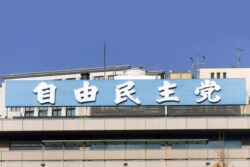
Prime Minister Fumio Kishida attends a meeting of the Council of New Form of Capitalism Realization at the Prime Minister’s Office on March 8.
12:38 JST, March 12, 2022
There is no roadmap yet to realize the “new form of capitalism” that Prime Minister Fumio Kishida adopted as a signature policy of his Cabinet, inaugurated last October.
Kishida is seeking a “virtuous cycle of growth and distribution” through wage increases and other measures. To achieve this, he established a council to realize his new capitalism policy, which he chairs.
But the latest meeting of the council, on March 8, was held after an interval of three months. Discussions on the overall picture and how to secure financial resources are yet to begin. How can Kishida realize the virtuous cycle?
Seeds of new technologies
Kishida envisions a strategy of first expanding the overall economic pie through growth and then distributing the fruits of that growth in the form of higher wages.
The meeting on March 8 put forward the promotion of science and technology as the government hopes to encourage the cultivation of the “seeds” of new technologies by strengthening research and development.
In the future, discussions will focus on topics such as digitization and the promotion of support for start-ups. As early as this spring, the government plans to compile a grand design to provide the major direction of the new form of capitalism and an action plan to resolve specific issues. It hopes to reflect these results in its basic policy on economic and fiscal management and reform, which will be finalized as early as June.
Kishida came up with the idea of a new form of capitalism, inspired by an awareness of problems with neoliberalism, which prioritizes free competition to develop the economy and increase efficiency. He believes that neoliberalism has led to widening disparities and that the benefits of growth have not been spread to all parts of society.
As rectifying disparities has become a major theme in Europe, the United States, China and elsewhere, Kishida’s approach is in line with the global trend.
After its inauguration last October, his Cabinet set out a growth strategy including the creation of a ¥10 trillion fund to support the strengthening of university research capabilities, the expansion of renewable energy and the digitization of regional areas. Meanwhile, as a distribution strategy, the Cabinet proposed increasing the incomes of nurses and childcare workers, as well as calling for more equitable transactions between large companies and their small and midsize subcontractors.
Rehash of existing policies
However, some call these Kishida policies — such as raising wages and promoting digitization — a rehash of his predecessors’ policies, already emphasized by the cabinets of Shinzo Abe and Yoshihide Suga.
Others worry about how the needed measures will be financed. The Kishida Cabinet has set out fiscal support and tax incentives for the purpose, but barely mentioned the financial resources to back them up.
“The policy directions are correct, such as digitization and wage increases,” said Naohiro Yashiro, vice president of Showa Women’s University. But he added, “What is important for sustainable growth is deregulation and other reforms that will increase corporate productivity.”
The worsening situation in Ukraine is also a concern.
At the previous meeting of the new capitalism council in November, Kishida demanded that companies raise wages by at least 3% if their business performance had improved. But now, with energy and grain prices soaring, the outlook for the global economy is becoming increasingly uncertain.
“Employer sentiment may become more cautious toward increasing wages and the move to reduce the scale of the increase may spread,” said Hideo Kumano, a chief economist of Dai-ichi Life Research Institute. “Geopolitical risks could block the path to the virtuous circle that Kishida aims for.”
Top Articles in Politics
-

Japan PM Takaichi’s Cabinet Resigns en Masse
-

Sanae Takaichi Elected Prime Minister of Japan; Keeps All Cabinet Appointees from Previous Term
-

Japan’s Govt to Submit Road Map for Growth Strategy in March, PM Takaichi to Announce in Upcoming Policy Speech
-

LDP Wins Historic Landslide Victory
-

LDP Wins Landslide Victory, Secures Single-party Majority; Ruling Coalition with JIP Poised to Secure Over 300 seats (UPDATE 1)
JN ACCESS RANKING
-

Japan PM Takaichi’s Cabinet Resigns en Masse
-

Japan Institute to Use Domestic Commercial Optical Lattice Clock to Set Japan Standard Time
-

Israeli Ambassador to Japan Speaks about Japan’s Role in the Reconstruction of Gaza
-

Man Infected with Measles Reportedly Dined at Restaurant in Tokyo Station
-

Man Infected with Measles May Have Come in Contact with Many People in Tokyo, Went to Store, Restaurant Around When Symptoms Emerged























